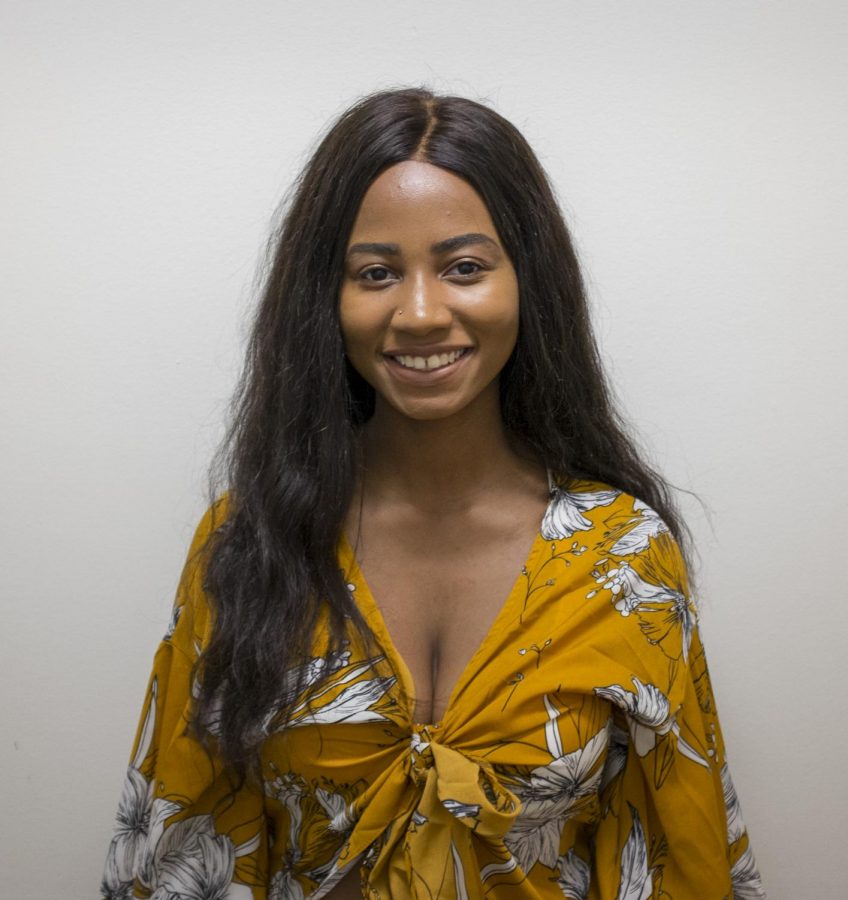Snow Bunnies Aren’t a Type and Neither Am I
Racial preferences in dating aren’t components of your type. They’re just racist.
September 11, 2018
A while back I was casually involved with a guy. He was also black. As we watched a show in his dorm room one night, he turned to me, arm still wrapped around my shoulder, and said, “You know, you’re pretty lucky.”
I turned to look at him, ignoring the cramp forming in my neck from the awkward angle to feign a flirty smile, “And why is that?”
“I almost never go for black girls; I love snow bunnies.”
My heart sank as he turned back to the computer screen, seemingly pleased with the apparent compliment he gave me. I sat in silence for a moment, then mumbled an excuse about my roommate being locked out and left.
On my walk back, I had a lot to think about. One, I had forgotten to log out of my Netflix before leaving, so I wouldn’t be able to watch “Orange is the New Black” before bed. And two, a man just told me I was an exception to his so-called rule about the girls he chooses to date. I wasn’t even shocked. Dread blocked out the disappointment. Now, I had to go through the process of ending things, blocking his number and, of course, changing my Netflix password. Not to say I wasn’t hurt — I was, but it was a very familiar pain.
For as long as I have been in “the game,” I’ve dealt with partners telling me I was a deviation from their normal dating patterns. I, like most black women, am no stranger to comments about my race, especially in the context of dating. These statements particularly sting when they come from someone of your own race. You would expect an inherent and mutual understanding between yourself and someone of the same racial identity, but that connection was nowhere to be found with this guy.
Racial preferences are inherently racist because they attribute a set of qualities to marginalized ethnic groups. When people adhere to racial preferences, entire identities are made uniform under the assumption that all people of a particular race are a singular, established way. Racial preferences don’t narrow down to having a type, which involves unique physical and personality traits — not racially based. All tall people reach a particular altitude, all redheads have red hair, all smart people have notable aptitudes. You could argue having a type at all makes you an entry-level jerk. But to herd all Asians under one typical trait, for example, erases the unique identities of the many members that make up these diverse communities.
I spoke to a peer, who is Latinx, about their experience on the dating app Grindr.
“People can be really weird,” they said. “I’ve gotten messages from cis white guys trying to practice their Spanish on me, making comments about my hair and one even called me ‘gangster.’ It’s also a thing for people to say things like ‘no rice and beans’ in their bios to keep Latinos from messaging them.”
My peer’s grimy Grindr encounters serve as a prime example of fetishization — the other, equally ugly face of racial preferences. Dating apps host many of these harmful attitudes — as in most cases with the internet — thanks to “Twitter Fingers,” a phrase coined by Drake that speaks to how the internet emboldens its users to speak recklessly and with abandon. Online communication has immediacy, but consequences are low — no one can yell and spit in your face. The heat of online communication can boil down to getting blocked or, even worse, suspended. Those who let offensive comments fly onto their feed, more often than not, don’t find the fault in their argument. The high frequency of these offensive comments demonstrates that online, anything goes.
Both of our experiences are alienating. People of color end up on the receiving end of this bias time and time again. Our dating lives shouldn’t be limited because of our race; we shouldn’t be reduced down to our ethnic physicality.
Here’s where it gets complicated, the point where people of color might seem to contradict what’s against them. This ongoing microaggression on the oppressed — those who have been racially profiled — causes them, in return, to develop their own preferences. Think about it: if someone is told for the entirety of their life that people of the same race aren’t interested in them, then it’s natural for them to look elsewhere to fulfill their romantic needs. These preferences aren’t from a place of idolizing whiteness or anti-blackness — they’re from a place of ostracization.
This ugly cycle will continue until we look inwards and challenge the notions we have about other races and ethnicities. And no, don’t date someone you’re not attracted to just to rectify inequality. Just don’t be racist; it’s not that hard. If you find yourself glorifying the fact that you’ve never dated someone of a certain race and now you are dating that race, get over yourself. For those of you who still proudly hold racial preferences 2018, honestly, feel free to voice them. It’ll make it that much easier for the rest of us to weed you out from the jump.
Identity of Love is a column devoted to exploring the ups and downs of navigating love, sex and relationships for those whose narratives have historically been pushed to the margins. Identity of Love runs alternate Tuesdays.
Cheyenne Porcher is a sophomore in the Gallatin School of Individualized Study. Email Cheyenne at [email protected].
Opinions expressed on the editorial pages are not necessarily those of WSN, and our publication of opinions is not an endorsement of them.



























































































































































